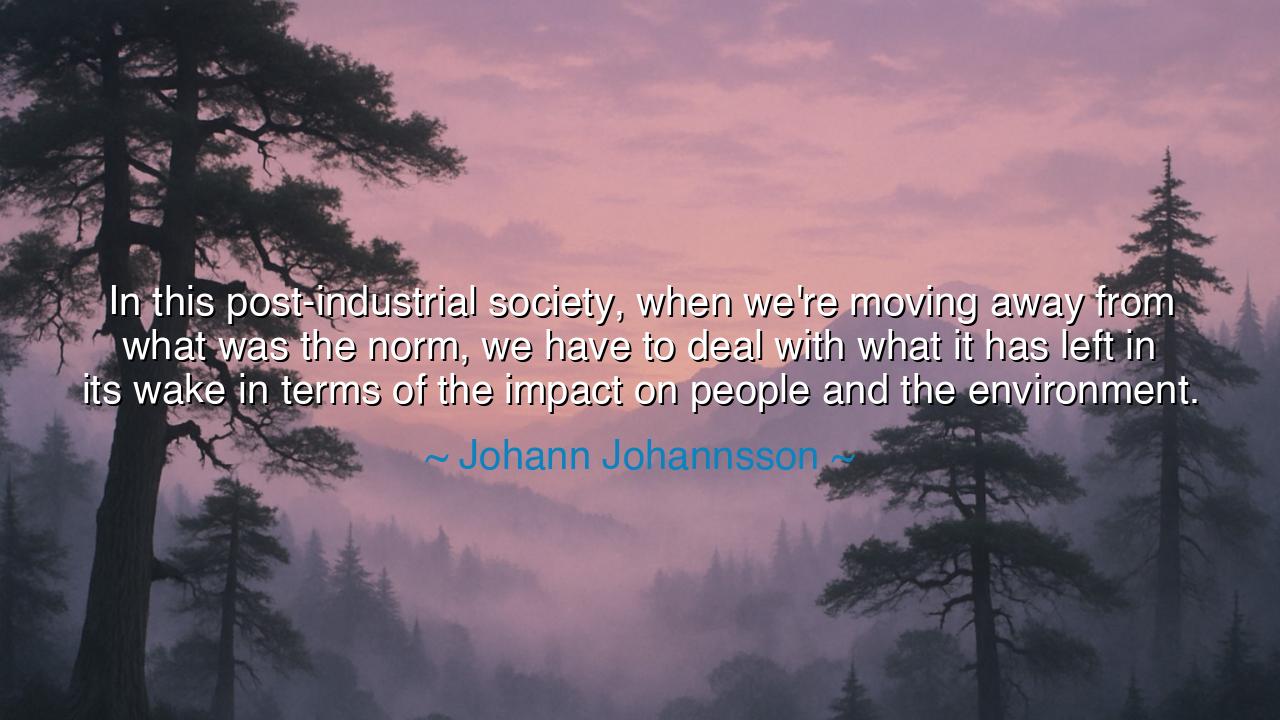
In this post-industrial society, when we're moving away from what
In this post-industrial society, when we're moving away from what was the norm, we have to deal with what it has left in its wake in terms of the impact on people and the environment.






Hear, O seekers of truth, the somber words of Jóhann Jóhannsson, the composer who wove sound into memory and reflection: “In this post-industrial society, when we’re moving away from what was the norm, we have to deal with what it has left in its wake in terms of the impact on people and the environment.” In these words is the cry of a prophet, for he reminds us that though the machines may slow, their shadows remain, and the world must reckon with the scars left by its own creations.
For the industrial age brought marvels beyond imagination: iron rails spanning continents, factories multiplying goods, engines drawing power from coal and oil. Yet these triumphs came at a cost. The air blackened, rivers choked, forests fell, and men and women were drawn from fields into crowded cities, where their labor was often ground as ruthlessly as the gears of the machines they served. Now, in the post-industrial society, where many economies turn to knowledge, services, and digital craft, Jóhannsson warns us: we cannot walk forward without first facing what we leave behind.
Consider the town of Manchester, the “workshop of the world.” In the 19th century, its mills roared with industry, clothing the world in cotton. Yet the same smoke that brought wealth to the few brought sickness to the many. Generations lived beneath skies of soot, their lungs filled with ash, their rivers poisoned. When the mills closed and the smoke cleared, the scars remained—unemployment, broken communities, poisoned lands. This tale is not of Manchester alone, but of countless places across the globe where industry once blazed and now has faded, leaving its wake of wounds.
History speaks also of great rivers like the Cuyahoga in America, so burdened with industrial waste that it caught fire, a blazing symbol of humanity’s neglect. Only after disaster did men turn their eyes to what had been done. Jóhannsson’s words call us to remember: progress without responsibility becomes destruction, and the past cannot be ignored, for its echoes resound in our present. The environment, once thought an endless well, reveals now its limits, and the people, once thought expendable, cry for justice.
The meaning is this: we live not apart from the legacy of the industrial age, but within it. The old norms—smokestacks, mass exploitation, endless consumption—still shape our society, even as we move toward new ways of living. To pretend otherwise is folly. We must not only invent cleaner technologies and digital futures; we must also heal the land, restore the waters, and mend the hearts and communities fractured by centuries of unbalanced growth.
The lesson, O listeners, is to take responsibility. Do not imagine that because the factories are quieter, the burden has passed. The wake of industry is long, and it falls to us to address it. Plant trees where forests once fell. Clean rivers where toxins still linger. Support those whose livelihoods collapsed when the machines departed. And build anew in a way that honors both people and environment, so that the mistakes of the past are not repeated in the future.
Therefore, remember Jóhannsson’s words not as lament alone, but as a call to courage. The time of denial is past; the time of healing has come. We are the inheritors of the industrial age, both of its wonders and of its wounds. Let us choose to be healers, not exploiters, so that the post-industrial society may stand not only upon the ruins of what was, but upon the foundations of a restored earth and a renewed humanity. For only then can progress be true, and only then can the song of the future be whole.






AAdministratorAdministrator
Welcome, honored guests. Please leave a comment, we will respond soon